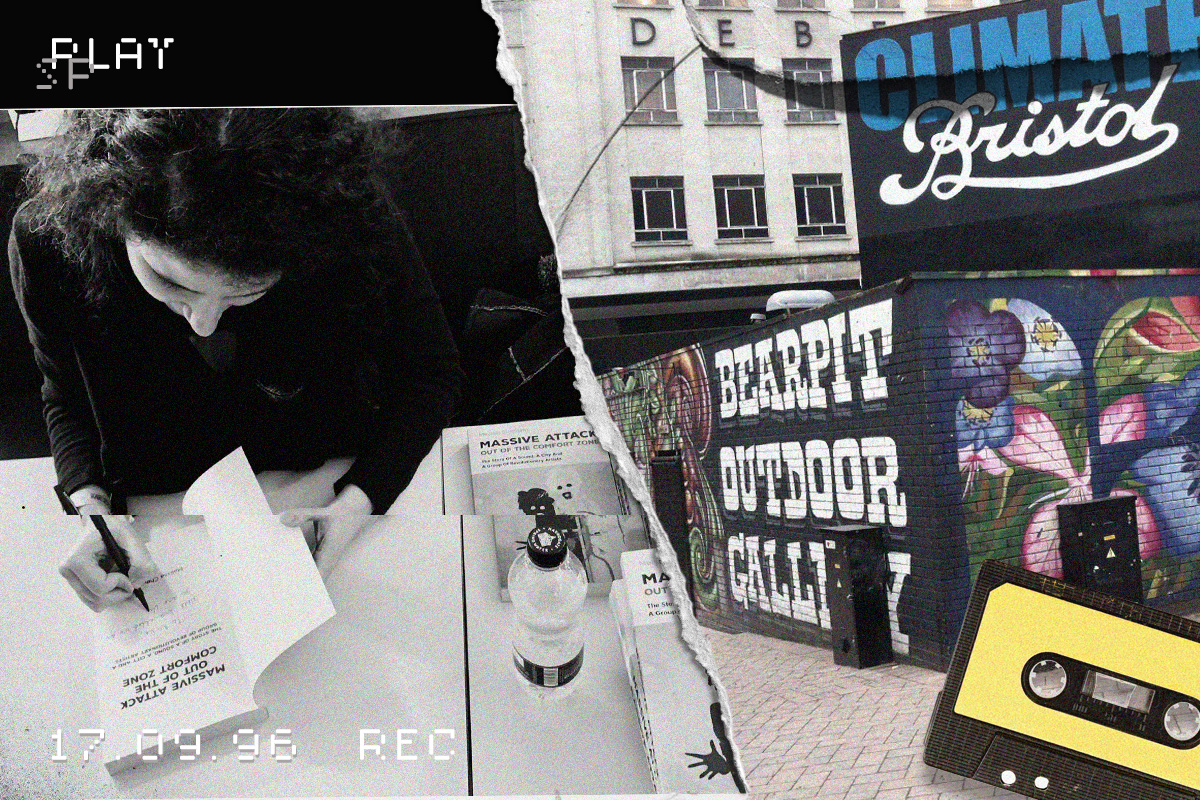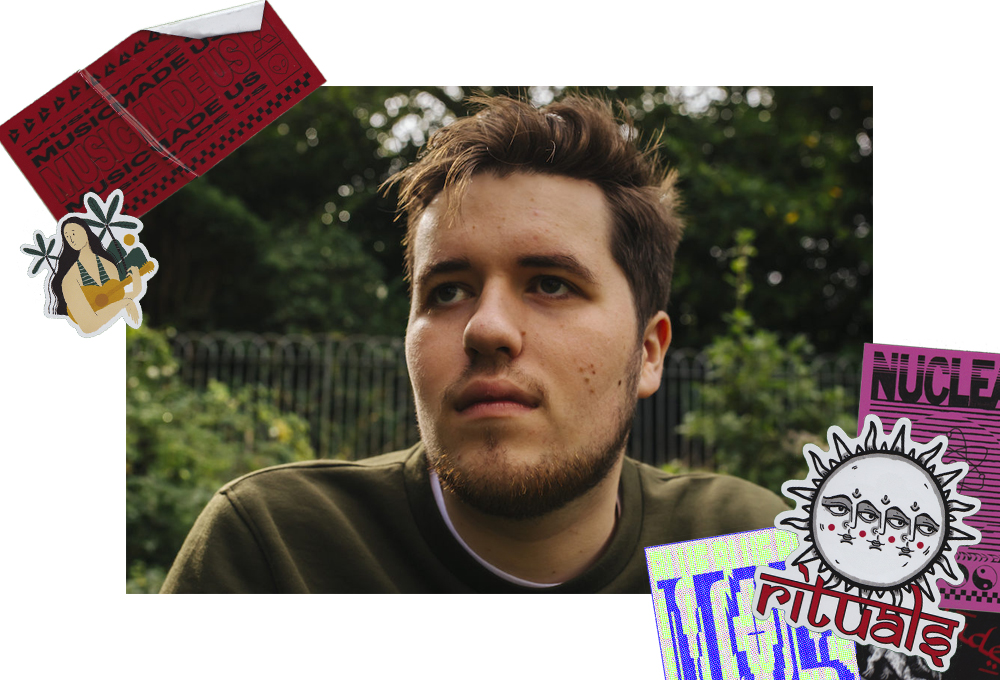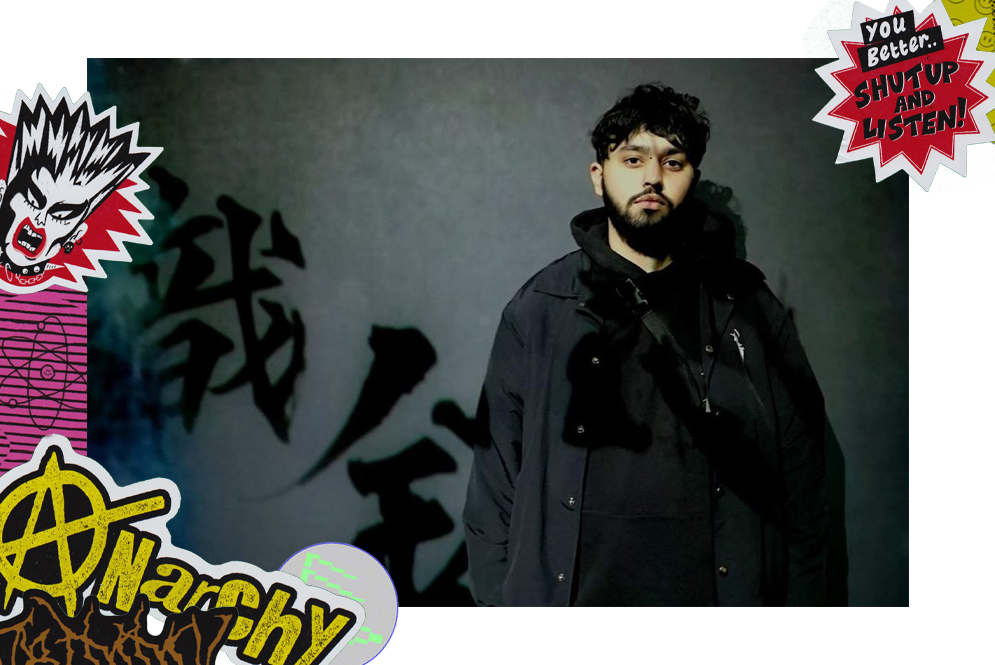As part of our Music Made Us campaign, creatives, music professionals, experts and journalists reflect on how music has been there for us through good times and tumultuous periods that inspire change. Throughout generations, music has sparked, supported and commented on movements, memories and moments in time.
Our contributors explore these events’ relationship with music – from slavery in the 1800s to the UK’s 80s acid house and rave scene and today’s Black Lives Matter movement.
Author Melissa Chemam’s book is an in-depth study of the influences that led to the formation of the Wild Bunch and then Massive Attack, looking into Bristol’s past to explore how the city helped shape one of the most successful and innovative musical movements of the last 30 years. The book offers an insight into the band’s music and art, their influences, collaborations and politics, as well as the way they opened the door for other Bristol musicians and artists including Banksy. Here is an excerpt from the seventh chapter, around the release of their second album, Protection, and how their influence changed the British music scene.
Blue Lines came as a perfect illustration of how Bristol runs at a different speed. Many artists from the city describe its slowness as one of the influences on their creativity. Bristol musicians are not concerned with commercial success only, and productivity is not a key value.
What it’s always been good at is the underground scene, in both art and music
“It’s like a town masquerading as a city,” said Robert Del Naja, “and what it’s always been good at is the underground scene, in both art and music. Bands would flourish locally before they reached a national level and because there was never a big media or music industry here, people were doing it for their own gratification. Creativity here never grew in a contrived way, people were just teaching themselves and beating off the competition to become a big fish in a small pond .”
In 1991, under the appearance of calm, a boiling artistic scene was about to burst. While Bristol plunged into this sea of creativity, Massive Attack had to face their own tensions and their first world tour. While their producer Cameron McVey was busy working on other projects, they had to get ready for their first tour dates, in England, in the summer of 1991. They still thought of themselves as a sound system and with turntables. Mushroom and Daddy G launched the tracks from DJ decks on vinyl, joined by 3D, Tricky, Tony Bryan and Horace Andy on vocals.
Massive Attack released their second album, Protection, on 26 September 1994. They finalised the record in the middle of internal tensions. The pressure between the band members was sometimes so high that they could not stand it. Despite the tensions, Protection received critical acclaim. Dazed & Confused wrote that there were “no doubts on that score: Protection is a work of genius”. The album peaked at number 4 in the UK Chart.
Where the Bristol scene evolved
Until then and since the mid-1980s, Britain had associated the Bristol sound with sound systems, but Portishead came to offer a more traditional form of band. Their second single ‘Sour Times’ was a huge success in the US and their third, ‘Glory Box’, reached number 13 in the UK Singles Chart, in early 1995. Then, another album from Bristol came out: Tricky’s first record Maxinquaye, released in February 1995. The name of the record is inspired by the name of Tricky’s mother, as well as much of the lyrics.
After releasing independently a first track named ‘Aftermath’, featuring female vocalist Martina Topley-Bird, in local record stores in September 1993, Tricky got a record deal. Martina had met Tricky around 1992, at 17 years old, while she was still studying at Clifton College. At the time, the rapper was mainly living with Mark Stewart in Bristol. Tricky ran into her, singing, in his street. Born on 7 May 1975 in London, Martina is the daughter of Martin Geoffrey, who passed away before her birth, and Charlotte Topley – who moved to Bristol and remarried to Drayton Bird. Martina always loved music and grew up taking piano and violin lessons, also singing in a children’s choir. Via her extended family, she had been introduced to many artistic and musical influences, from the Beatles to the Specials.
“I remember hearing their song ‘Rudy’ in my estate and the Beatles’ ‘I Wanna Hold Your Hand’ in my nursery or in the place my mum took me to get my ears pierced!” Martina told me in an interview. Her piano teacher introduced her to jazz by from 14 years old, asking her to sing in his little school jazz band.
Getting closer to Tricky, a few years later, Martina and him kick-started their musical collaboration then a love story. “The first track I sang with Tricky was called ‘Shoebox’ and he told me that Neneh Cherry and Cameron McVey liked it and were thinking of using it for Neneh’s album,” Martina added. “About five weeks later, I sang the song ‘Aftermath’, in the same studio in Bristol. One of my best friends had just left Bristol and there was a weird melancholy in the air for me…”
Tricky played the first demo of ‘Aftermath’ to 3D, who immediately loved Martina’s voice, but Massive Attack didn’t pay much more attention to the track at that time. This led Tricky to finally work with Island Records, a parent label of Fourth & Broadway. “I got to work with Chris Blackwell and Island Records,” retells Tricky. “And from the start, they let me do what I wanted, it was never a business.”
Trip-hop era? And so much more
From 1995, the music press increasingly defined the “trip-hop” genre as pioneered by the three major Bristol bands. The phrase was used for the first time in June 1994 by Andy Pemberton, a journalist for Mixmag, while talking about Mo’ Wax Records, very much inspired by Massive Attack. With this term, Pemberton underlined the hip-hop elements in this music and emphasised the references to smoking weed. He also compared Massive Attack’s work to the trippy Pink Floyd.
The tag soon became synonymous with “Bristol sound”
The tag soon became synonymous with “Bristol sound” or “slow tempo”. 1995 seeing Massive, Tricky and Portishead taking centre stage in the UK with three defining albums that quickly influenced other bands, a shift was undeniably taking place in British music.
In Bristol, many sound systems had emerged in the meantime such as Roots Spot Crew, Kama Dread, Addis, Henry & Louis, and Armagideon. From 1990, Jack Lundie & Andy Scholes started publishing their own production under the name of Henry & Louis and launched the Two Kings label. Their first release was the EP How Can A Man, mixed at Smith & Mighty’s studio, on Ashley Road, in St Pauls, with vocals by Andy Scholes, heavily influenced by reggae.
But Tricky absolutely hated the term and looked at how to distance himself as much as possible from Bristol, while Geoff Barrow was dreaming of sounding different, working with Tim Saul, rapper Mau and their band Earthling on their first album, Radar. Grant Marshall stated as often as could be that he felt his band were ahead of these changes. He and Andrew Vowles both resented the followers and the whole idea of a common genre.
“We used to hate that terminology so bad,” Daddy G later explained. “You know, as far we were concerned, Massive Attack music was unique, so to put it in a box was to pigeonhole it and to say, ‘Right, we know where you guys are coming from.’ And we didn’t know where we were coming from half the time, you know what I mean? It was a resistance, but then slowly but surely you come and realize that people need some direction, and some pointers as to where to go for this music. We made this slow, ambient music that was meant for the head, not for the feet, you know, to dance to. There was nothing like it. There was nothing slow or intelligent .”
In its list of the ‘100 Best Albums Of All Times’, Rolling Stone magazine wrote in 2011: “The Nineties were the all-time high-water mark of silly genre names, and trip-hop may be the silliest of all. But Massive Attack really did invent a whole new style, manipulating hip-hop’s boom and reggae’s throb into their own slow-motion funk noir, inspiring Bristol, England, neighbours such as Tricky and Portishead to explore cinematic dance grooves heavy on the atmospherics. Their influence has spread to all corners of pop and rock, not to mention upscale shoe stores and cafes everywhere.” Protection is listed at the 51st position in these rankings, Dummy at the 47th and Maxinquaye at the 70th.
For DJ Magazine, there was no doubt Protection largely stood out: “Back in 1991, there were two albums that mattered loads to loads of people; reflecting and magnifying the uniquely British hybrid of international cultures that exist in and around the club scene. Blue Lines, of course, and Primal Scream’s Screamadelica. Fast forward to 1994 and so far there’s only one album that matters in so much as it breaks rigid genre moulds. Primal Scream is off on a sad trip of their own and Protection is out in front. Crossing boundaries with ease .”
But the Bristol scene also embodied at this time a vibrant group, an ‘out of the box’ creativity
But the Bristol scene also embodied at this time a vibrant group, an ‘out of the box’ creativity, away from the mainstream lines of so-called ‘Britpop’. And a few bands felt even more grateful for that sense of independence. “I’d attended the Brits in 1995, too, and wrote later in Bedsit Disco Queen about how proud I was to be sitting with Massive Attack,” Tracey Thorn later explained.
“Protection was up for a couple of awards, and though it was the height of the Britpop Oasis v Blur battle, I felt that ours was the table to be on, with Massive and Tricky and Björk. The rock kids seemed to be trapped in a dreary rehash of the past, still repetitively harking back to the yawn-inducing Sixties, while we were with a group of people who were looking forward.”
Raising the point of putting the bands in different categories, Tracey added: “By 1996, the two strands of the music scene were in direct competition. Our song ‘Missing’ was up for Best Single and ‘Protection’ the single for Best Video.
Massive Attack won Best British Dance Act, while Batman Forever, featuring Massive and me singing a Smokey Robinson cover, won Best Soundtrack. But Oasis won Best Album and Video and Group, beating Blur and Pulp and Radiohead in those categories, and when Massive went up to collect their award, 3D made a sardonic comment, saying, ‘It’s quite ironic, ’cos none of us can dance.’ It was a joke but he wasn’t laughing, and I think he was making a point. He might have said, especially given the most recent album that they’d made: ‘Why are we in a different category from Blur and Radiohead? Why is Protection a ‘dance’ album? What is ‘dance’ code for?’ It was a classic piece of Othering. The implication of the awards, and of Blair’s speech, was that the white boys with guitars were the Norm, and deviations from that were the Other, and certainly not the main story.”
This excerpt is from Massive Attack – Out of the Comfort Zone THE STORY OF A SOUND, A CITY AND A GROUP OF REVOLUTIONARY ARTISTS By Melissa Chemam (2019). Buy your copy here.
Our Music Made Us campaign is told through the students, graduates, journalists, experts and passionate people who have been shaped by music. Discover their stories here.



